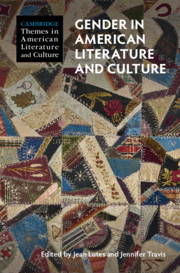Book contents
- Gender in American Literature and Culture
- Cambridge Themes in American Literature and Culture
- Gender in American Literature and Culture
- Copyright page
- Contents
- Contributors
- Acknowledgments
- Introduction
- Part I Intimacies
- Chapter 1 The Price of Freedom
- Chapter 2 Post-Reproductive Female Sexuality and the Early American Novel
- Chapter 3 The Effeminate Man in Nineteenth-Century America
- Chapter 4 Rereading Puritan Masculinity through Trans Theory
- Chapter 5 “Unbounded Grief”
- Chapter 6 Rethinking Reproductive Freedom through Transpacific Narratives
- Chapter 7 Slow Emergency
- Part II Aggressions
- Part III New Directions
- Bibliography
- Index
Chapter 4 - Rereading Puritan Masculinity through Trans Theory
from Part I - Intimacies
Published online by Cambridge University Press: 01 April 2021
- Gender in American Literature and Culture
- Cambridge Themes in American Literature and Culture
- Gender in American Literature and Culture
- Copyright page
- Contents
- Contributors
- Acknowledgments
- Introduction
- Part I Intimacies
- Chapter 1 The Price of Freedom
- Chapter 2 Post-Reproductive Female Sexuality and the Early American Novel
- Chapter 3 The Effeminate Man in Nineteenth-Century America
- Chapter 4 Rereading Puritan Masculinity through Trans Theory
- Chapter 5 “Unbounded Grief”
- Chapter 6 Rethinking Reproductive Freedom through Transpacific Narratives
- Chapter 7 Slow Emergency
- Part II Aggressions
- Part III New Directions
- Bibliography
- Index
Summary
In 1991, I argued that, “The Puritan patrimony has exacted a heavy toll on men, a fact borne out by our present ‘crisis in masculinity,’” which second wave feminists identified as the existence of “a rape culture” in the United States. A contributing factor was the narrative of religious conversion innovated by early New England Puritanism, which required believers to become spiritual “brides of Christ” in order to be saved. This devotional rhetoric not only colored Puritan poetry but indicated deeply held attitudes about spirituality, embodied gender, and social power, which shaped subsequent US poetry. In this chapter, I revisit and update these claims in the light of trans theory, reread poetry on spiritual gender by Anne Bradstreet and Edward Taylor, early New England’s two major poets; and conclude with a discussion of Emily Dickinson, who was raised in a Puritan culture but makes irreverent, even subversive, use of this legacy.
Keywords
- Type
- Chapter
- Information
- Gender in American Literature and Culture , pp. 66 - 81Publisher: Cambridge University PressPrint publication year: 2021
- 1
- Cited by

